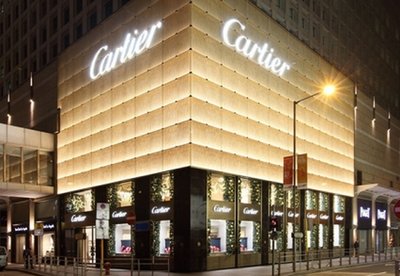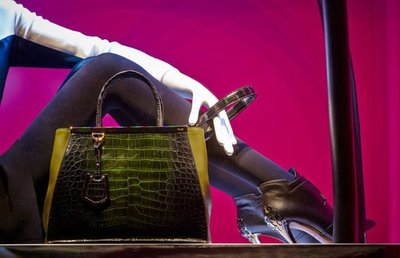The top executives of the world’s leading luxury brands are optimistic about the future growth of the industry, expecting a rise in sales of more than 9 percent over the next twelve months, according to a recent Departures survey.
Departures magazine and Ledbury Research’s inaugural “Global Luxury CEO Survey” of the fourth quarter of 2013 surveyed executives regarding the market, as well as strategies as brands continue to grow globally. The survey found that 89 percent of CEOs are optimistic about the state of luxury and 89 percent believe that North America is the most important contributor to growth.
"Departures' Luxury CEO Survey forecasts a 9 percent rise in luxury sales over the next 12 months, and 89 percent expect North America to be the most important contributor to growth in luxury business sales over the next five years," said Steven DeLuca, senior vice president and publisher of Departures, New York.
"The focus of our survey is on the direction that the globe's luxury CEOs see the market going," he said.
"Currently, luxury CEOs are focusing on their top customers, here called VIPs."
The Global Luxury CEO Survey is based on the responses from nearly 70 senior executives, mainly the global CEO, president or managing director of companies with annual sales ranging from less than $50 million to $1 billion plus. Industries surveyed included travel and hospitality, apparel and clothing, home and design, jewelry, watches, footwear, leather goods and accessories, fragrance and beauty, electronics and other.
Time Inc.'s Departures magazine conducted the survey with Ledbury Research in September. Rather than focusing on the past year, the Global Luxury CEO survey chose to look ahead to predict how the market will evolve and grow.
Looking forward
After three years of consecutive growth, the study predicts that luxury sales will rise 9 percent over the next 12 months. This growth is propelled by ecommerce and mobile commerce along with other factors such as United States and Chinese growth rates.
Although 89 percent of CEOs are optimistic about the market, external factors are listed as harming business. Of the surveyed CEOs, 60 percent feel that political unrest has a negative impact on their businesses, especially among those in the travel and hospitality sector.
According to the study, 58 percent of respondents feel confident about the U.S.’ economic recovery. The U.S. recovery is seen as the most important contributor to the luxury market as East Asia, particularly China and South Korea, slips to second place for the next five years.

Cartier's Hong Kong flagship
East Asia’s slowdown can be seen as a deceleration rather than impending stagnation as Chinese consumers spent $102 billion while traveling in 2012, per World Tourism Organization. Europe especially benefits from this trend, as five of its countries are of the top ten visited by affluent Chinese consumers.
Places such as the Middle East, Southeast Asia and Africa have seen a much slower growth due to result of political unrest affecting economies. Fifty percent of those surveyed feel that this will significantly impact business.
The moving-up market
The growth and evolution of the market is fueled by VIP consumers who view price with little concern. This group represents 96 percent of luxury consumers, many of whom are self-purchasers rather than gift purchasers.
As the rich are getting richer, one surveyed CEO stated, luxury brands must adapt their strategies to cater to these top consumers. In a response to the increase of VIP consumers, luxury brands are choosing to move upmarket.
In doing so, brands will steer away from outlets to focus more on VIP consumers by raising prices. This strategy will help differentiate brands from competitors.

Fendi's crocodile 2Jours handbag, a Harrods exclusive
Raising prices will be justified by better materials used to increase the exclusivity of luxury products. Many of the surveyed CEOs were concerned that their brands had become too ubiquitous due to low-end collaborations and outlet locations.
The projected priorities of luxury brands for the next 12 months include investing in digital, improving retail, building brand identity and digital communications in Asia, collaborations, improved services, shifting focus back to established markets, and brand and product extensions.
Year to come
The predicted rise in sales will likely begin during the strong holiday season by VIP consumers who have worked hard throughout the year as brands move away from attracting aspirational consumers.
"Post-recession we know that the aspirational customer was more challenged than the VIP customer," Mr. DeLuca said.
"We consider this an important indicator that in the near term luxury houses continue to believe in the strength of VIPs as a group that will drive their business because of their willingness to spend on the highest quality available," he said.
Final take
Jen King, editorial assistant on Luxury Daily, New York
{"ct":"4dkNBCBvRGttvAxQiYBv6V01dMhh6c1G7jKF8FlqKUHbqSzA1WJeLacXvQx7hN2xGPDB2Hpyve9FfgjOaYcMoEvHFaPkszOxFbHX0CW5yX4+HUQZh5zl01vG9hkxOFjx\/H8y4X3uKH0JTgw8hnm\/wdXIlV00opf9mourkwS4koU8PR0HQpa0P14nXb\/qmUQVqlcGFKJnOFRBrcUXGZi6HSV6ngAnbneIVvQfPohvfRjCQfoNslUM6NxxwwC9gAl86toLl9nOVrJb03l98WD0MLwYc2aL0yyjagyPzzUOas9HpVVQLhgSSFfUwhv1Ov+iKNufe4iT61urP+Ij9YvDiMWIOn7pm3yFSGxZtoDq7j+oiqSkcK0KcD5QkkE2TU0M8uXODmHF44M9VCEbDYLHCbV00expEImQ\/j9xeSHU8WcQW1na92oWgOWzMlH5SqIa03N4w5cyBkkyl0Ry05jEeMiLALA7R51MjD\/vgCjPRooeiO4+c2eMH\/y51UULy\/srLDNJvKY\/AciafkZSYEt\/MDv3D9Hx7YtoWyvR9eERJ2r890dXMPTcMpcW0ocPGLg7iIk\/WvaV\/FeZB1KlhamoHSQa8ol3hilo2Jrxh5V\/fqOUS\/cPa3hQftDGtBu8Efrz2DOWpLHb3KdGltRs5UX5zAz2XSw8O0D3CZZ4m\/aarPiJf9ufeCSjdJOuZy8MZ0LvKI12vtIiqwQVHsZtk4uiIJqzhTuBxrO9urO+qWNbayQ\/dHrRxAcEnvccm5EtTVG38PGvDPaJMGgosuMoFT4MOsfVQnOdEIKWd9sSM07g6mRfpDgGHrwrXrMlYkMm9eb7sYqvUEh+mg3avkWYcb5jyT2LSOpF9LSGDjrxbLlOduaBoX5o3Hf3nmk3DtEGSTL8PxSNEJvRG9NA+IbM\/R\/cvMsuXNVRPR9+5ow33FvLD2KQ+rmoU1tcfx8xFhGSsKSwM7MqpZq6omsh9qT5jzdQO4i4xLzCQcPlj5d7a+yJgwYsZDEGv17prhDhhAzsBvKlyBYsda5cAtZvQUYmlSlCRvJpuGCbaluOXK04fTlX+PoK2lQWZXEdnru3Pc9Z+dfRc4tgBguvHDKVN+F\/N1nV1H25nazwvGzYSQwYWSCjEZU3PoBlPCqHicMbe4AEqu8Ro+k\/i5U2tnx+OZ5Q3bqBGYQSBQXNEjweZWj7ftswAqXcMRcFLOHXplDCqYBOZiMUJHkQAn0VLnt55Y8MSUqiVQvVikoQobIfBmDIcAxdgRYkmXPdcA7pcfh1grhUuZqUTiCkl7PpdFiXcuNuMD69lS7I7JrfVrxpf0egkbdnF\/\/hq0iDWXfmmllAIgNnXmKgeSkY+94hM+gA8aEW1Xk3a8+cFnAI8OPGs7ogV2CKKnh6+8k34l8BhxUavkGH\/CvIygpS2o2DEK\/x3i\/cgKuTfDmgGWZX3+uDbvk9VBFqVFgLHEiEth846AN3ljFslgvqFRslr0Pw1ViRt4ZxUqoNHvJbQaTVmvmv2XWwaH9xZX8\/aShVyKpIsrAV5kkJvRf8g1M3UyHUrtCobVSA+LCMqHSZ2IkuD5wZiDHMDejXDzLSjTcK0xOieXc7WuxrU5ulhoP\/zQKIIznfxY3ECJO0o1QgHOKLvol7wCU6x42eGr359eoRXpzmNKY8MrpPZZ7lRm8dfQ2ujyCSC+Ntltksbo2kE4GYvks62LWCRIIpMlfoblXAii2nPYGqB64ZaOSCXsQ3MprqEg\/Y1OaXHtIvmcmWL2OnKTf+uaGalL7SyBykPGYGG7AKq22dBvAM4ow6FZJix5jvKK07XkwS1AFfa+a0eIAiYiFYzoK7Hq4AeAgRlJAt3kLT8gz93+b6+syj4dVL6mL\/uz0fzw+aKzPq1TTIXBCm\/c4VHYvfE6veYlsGNxzPbdLCfGVr9GZ6mlh+Q7pyjVT4M3SxG7Q0XI8M9rye0+Xp0ZSMkC6McSQUGFxWFtehPqy3qhAU7E+QAHs3CruNVY+MR8pSuveYWWKF21IrdvpzUIZuSY3mSoQ643mInnX8QdSiMcKnNiwPWi97ICrk4u6A8u9naGDEEsw\/+fc1CMa4+BGpjJIV4ZB4dXM8sPgHS3Yi8lW\/wZGeTtCcHvr+9oUM88\/C+I\/qRS5OcaPXh\/1DRTTbPcOPZaxm81otiVeYZzMrlnuYr7a1F1ySmVrCHBQsEbYAGb+m5600Imw4ezzF34PWPpd1Uy0UDR1jN2\/pKJjj8xmB5M0hwaWN2ckiypJm+WjKXgbJfTooc\/RnaftMiegwrXMi8CkupGhAvNwHgCPUMvAQ5hTldhgVEnhYFYDgaN6c4o6Q3sk7dZ4ZsQyUfjdxZ+rKHK1o9B25z96b9R8PZxg+82TBf8x9wEKspoF1B3BY9zVmF1xMsMHh7ZjbTZIxoeWUEXFgIgsC2jSxJD4EJm45y85nFSHc9wuRV2BWHCuftxYtuUrrLm9l1PjRS3v7Yz4+fUxU1FlJcpXN5smh+aeHcvdSRSwZbqatV2dyfZkvIvgrzNagWi5+HU3HSlzk31Ozz+9lwxoUydriGmLHacAM+i9B2fOoKTHg9nEOUpSVILyyRFPExCSEYaIQ4eLIbFKlyNoyM4CDKAW7Fq2XaJCuKk9MURY2C90+GlBV1mDpDFLyvG7ezijyzX3OFL9AmE\/sEs+SNe187e4VABeuHiJHUpO6GmTC9zgkUcCC09pH0KwKbnxV8YrjttPISbDueiWE+UlHAcverwwJPgF3p2i3lcaThQJnW8NRJcoFnoy6lGH3oZ6X9O3c1OElS3cvkSgNNh699rV4GITgdEjiF9fFSPrn52qA50eYHQzuhym6xpzqQPPj3ChbSt7iFhPieIfpIgwPR+TxQt\/ETjz474JkuuKjLlFav4csTBuelgINbbLCV\/Gpdre5NFxjSDI8amUYQZjzA3XvOOFgbgdClvF7B4GRgFpHRNVUNbG2iKSIjwoGjb9c08DVuCrLQjSOMI2j7keku0A+nAmQUOUNaMKS8CrKK2XfCe7wu01Q5bZhiIq+7pFx5kVD24xVxcDcnz5gm2PjMLoRzxAFpB9aRsJMR6+f3ljcKeSzmlgRb4R71YymfXMmhtOlbcCXjDavjstt+YXoVEjV4Iz6DLKLRSTglj3fRvJijHhK58KLSkhObrzy7PDJnZFW8YN\/QCarwN3klDUx3cWeslNuno3k3VyQLZHGqgTLFZ5SlgG0dlu22j473mOUBnVG4vFeK0\/DLYxzUDW0oaDs32FKxuf9uAeWMU3ewE7DTtcRZReX5yY7lWz3uyHc1qLT6DzWxYh2Ui4je2K1RmOzNbweeveqS7KHLwae35j9E4KAc\/QL88EbrvfEOkHkLIwKL3CpQwIP646J8C7yCC1j2Vx2Qqc\/KZEa3DODXAYBcgP2cagGLdGQlQpZrDSBOqbDIBnYu4luWbwXlJgQBYXpogLYis99H+XzEyI99+TUDJ50DnOOnG8EsVe5xViBqDZRCP7oYjUjuIpWsAUkCOPfbJkB5fkw4dR5WbClI6IjHL\/3sJBJQOyT73Wa0AnCRT3bd493BMxYHzrJdph9br\/nkpJwuMmjvcHqLUn2GMvfzWGpf\/8dmfuB0YddQnG\/26Kxzy6NNYjAnOGpMUoA3qMHspLpPvZ7gSGkq4qh9LCCKVkf0QRYHg9NRlpkesRp+wMt2yNTbZ2sursp8fPcLbWbjn1OIq5nw4FIdQrOgY1WSF3WD5YUP97\/BlfayKK+fRGkoTai2PmZNvnkNvQy1D9EO1SIe68z\/kxkJd7KFQMy1Ynf9n0NhiIphBj1nuH\/If8DcidRRF\/HuZsmrQ3864z2fRKbaXQ7rqjFXR+hfrqEEsNd6mLSEfReeWC4sIykw0Xr6W\/sxfscShY\/gRaoupeEMD\/S5l1gxnKpwNe5LwTshtkvzoxZ5bmerwo5vRWzpO\/4C0ch+1AJHK24NV4XDwpmd63sToUEv8Xix\/LDFldYXjoWoyQJb5yApMzEpHa4OhuH4CJNNCDwRLaoJm1NSfJSWnPtodkJ0bpc2laCUq+p2e5SL2znMhCXwgOrke2Vj2Ayhn79FHHiZ9qSXAHXiofge0IdlyCLQ8osetP+bvL3ypqlg5uGxS+5D11w\/Nggq\/RbKz7wJPrS3TZQDf0Kst49OvJkEfJ0inpmmhP83\/kBT3x4nUMtAEFYVGYISVp8oUJUF2UaV14J\/JU2eQ9ooFFlvuytuqQhZsKQimERijlQQPD1hXgsyo4GV3kevWyMiSmMn3CH4p2KMzWb+5i2DGtvwFJnEs0pLcLuHwXOrSGIBtMPN9nbeu+ykwaKooRO8q+EJ7fgbIuRuGhZu\/x8HbgQvdhHYMSQQvgubSMk7z4uvjHhr8G9r6w5E1qUizyeATNCM1swnEHgI6yYpu7eZzx4GZuYrK5QSpzcQ7vY3AUu\/R2yDVS0sbQxDyZNo+AF67vgM9fn0aCnSTuPQl2J4g3rKnIdRxUZzeVHIJ5QEd0PKySq9\/8n7xq7++AtCZNsYsRxwXn8wX5gq0TgtZ7cvRKFObv3viVftvMFnbVleAu6S0TXoI6HNoEKHehkVaJcuhe\/M4fNtojOS\/OvxIe9ElHdSVc5KgBD0UgozrG3q+a+yAkUUmdWSyUf\/x+bFKVZZVGHE1uXUH1Pp42f1Mhm0elLZXSWkJY4gJMyH9\/n1cyXhpxwgVJ0QLI6JjtVVhdFjQX4MbHUFXfCiFggjyiuyPcYbBUYXk0gYD67P9Mw42iNlH4yTV7CpKA9cEs9Mg0ipN4ObgpK8uNNOPHzbaivVeoGsjLI68SahLFXqCNqcvQIkozdzpWmemFl6hW0K+SG6S7Sbpyyshu5Z+qKo3MpFiY+Y0A02tUotZVVo\/Fl8QccO7Nd7imIY0RN36V\/z9+3sbAICgGTxM28Q2WNCRY3tOr27NczAmTSja3I6iQ4sCHXt8rUSnFYDtIh3d1mPTC+GoWvFQa0+W1+okjMMspxSdjKtzPk5iQs1Ep5WcRAtnUGTBIFRtF6SN8vv6nngtgft+P4dSqaJ0zq1sAodpcU3QXSu\/s473g3bFOvqkMhmolIaKvjU\/vQac4AqTUe+sjAsOxPVXbDV2d4T65mmqmuBLL4k3xLznPguVQ\/d2mFiF0OfOk23wQsMhkV8FiJ9yPcEQg4Eo+vVthGJNlpgX5YDUpBhHv1CLBiAjdz5ND6TUSk1VNufNnbaQnebOA4iITCyASGhzbkZ9VrRZj5iAXb7bOtqca+yIWXLrSo01YRh+6LMbBPGeGr\/EH7+4Mh7iG3uujd+GX+C3BC0v4gUA9UN5spWamwXBGBWwICELw4d7E4WIH+Eo+IR045Cv3zMgnzf2+\/pgz2vH6HAo4Rzk\/mca88ZV7SrpZhpbz9i+EQYy5k5TT1pHHAX\/bMAyR+BjeVKsxrIyO4OOZ122wTijsyeGlEOIii\/8yEXklWPW3hjA1P2GhzYwC1o18DBWSZ5qFKqWLVsVeZZfubq9WUUTkPAS4DDKN4xv5ZKXah1+31stsOwj6hgrFnrsQTDdP5GnmeEbk6Zcz1mNfTakzlSGLciz9pva+Qovc1xled2xCFX2XqQ3YfcNOkHQlwZHndnR4l93UQwYTmArKE25QFJWxE0HaAKz8MooxruiDsAbax4OqFBDI83wl3oAb8TxQg1e8jlD\/92n6\/iCvZn6PkEaPYsktxQU+wCBvfDArG1lGGCTqjFhYMFbq65dcI\/IUs381yhFa6fQXfmdKAPYcYokuxdTFOS5gf8\/jWnSP9fFevQRTV5SGx1oInv9ncGXBbIEw7il33y7GlPsbmFa\/f\/KSN62UoTt46FTXuQUosRdiFFXgmWlFRSXP2v4WXU7qcjMZ+Xfim+5FCfJV8\/GpCrXUbakwkXRALVkZSoZrGiWvxoYCCchZGqwyIXT0GvDTcNCFVj2GYes+cnyiTIvnvUitMsxbO46YbecMGoQu6NBUFRmJqsVhL36kSYAwqov\/g1KsacN6EWjKj1kCfjCyUPahq0dcT9AgiMMHfjNu3BwZ0OArwSwtC\/fsDHssv18FffLy+fT2RI98F0DdiZJODj15KoUpyYuJxs2j9bXnPk3U5cBaRrXlKSq2ckEkmOX5YMN\/+wchfwZWWstGIDawVyxIKqsO6Zo6fIt9uyk1k0nNPFSEVyKCfFtwaowkfKBkIdZw3OFwvXmJZVn3avjf00h0g0uPCOR8JOmUsrH8A79Nx8B36\/Ro\/SWqaMRorc4MIlfADfyznL0GJky1x1l0Ee2WOpcugr4rQtfXIC1c46NcSG\/gkUTvjKrLssT58ur\/isHN8FMAoWnoz7iEZ0OrscOHBwdf\/2eXyWPSDX+z4t1s2I9+8v1Ty6uGOjS3s5R1JlrlU8mwZBZn1uFZa0W1naWWL9rP7gCNqpY+vZEanGgf56ghOwXVUEEdjYqiXxweRY6Y9t47HKU5LHsVFW\/Ghznba0ITjbn6e\/JrcV5iw1TWUGYR1H4Ffx\/MSmON1SaWWb\/wZFKAkHQom2JpTy4yMiNY3A6KRIR0m+z1caU5Ugd41v+t5++dBFTW+uWoPAvCxXE5tUQvda\/1ACoHyee9m39UUZAd9JSgXdZ9vuaTDvHKsdtVQKlMQUk4u7jovX55xEGt3U4pXosESC4sS50snIX\/\/61G5jG9VH\/hg6ZawAKzm5\/fm8k5BgMYNOXpxspILqOabiTDe4e4S9jy0SeeQCJLs41KMoetXuvGfgiLhf8HPfRCV1FvdgY7+6GfcvkF0mHi5UvRniHeIdGClHuUEeAT07TkZn366gkqYli9xeYfrUyfx0c1R7+4YZs6w9ri9nM0gu0nWc6B1fTitVn6DJhooLP43UMB9mgpDT7NO0xhE92nMiamjDozbfTlmMgLEEAcogClErqxOQTetd8j6W3n6lNQ09bv35bjnObXA+oWZ3BDyQgbdg+Wi8qjJ447lYDjkdjD0zdSsnylf7Y4pdSRvzrjdz+l32beyY9Z\/yUp5VnkCv5Zogzev2p+LhiaJ3PGvh3I6esQD7rzOtJAXgFy5Cbh2I145ZXUvwI1H29EK2FvGk0uXtAELmFCdMqgozgkKtSvbmUykjMKTtHbC3b7Ps3VdZn6kOLJzR0ymq1BjOUYfXQFAljMUzMKdEbFuj6mrijxyXrVamD8qSJfEqOo0fBC0dOfvOqLe3iEpLPdaDVDH3QdQaGZ5FfQRFJq3cj4d46IsZfl5bY5dEpvz2DiJQlVQsfQC\/uKMIfCoi+0pbopqdv0AgyuzVnB6o\/XQ13ii0M2TkzQm2q0mBKZlYimxIabuvCDy5K+f1cUSIqbdygvqdp8ElNM8+RJOmvkOhwleDmyX\/zoWGLP8L8DjknV8KW0h6R5v2jCnOmkW2iWQrl+b1AUMgzZhIREL59gqMgSbdcyeOy520+lAkiuPKhOLO9nBZnublL2\/RNVTts5sVKBDdujoAF5O\/Ly8d3wokDdIBdaJeJ7x9a6BYuNhL6zdQj0sCVyChf+H3FnubtpOTZw8qcg9fZ6AlSYojLqGHuaXr2RMKMbdHatyO9tKp\/J29TujR+pYw1EBVhQfLn5ljiLWnr1kpSv15HwdEOAB96dgZ5HeIMZVutssF+YFcaMg7wmDt1eMrMNz\/QwOYlLdo4SYQgRTH4HR+YdREdaEwgf44yLRcJl1\/c1yeHWjy10+1bGMx2Lr0C41AO6fKCluZ+segiwoZvSMrEIrN3DvsUtNjB6ma9aFdjuQohZjbdbeAs17MzYcM5+8TnVVSW5qy9UZDa9FUSqHcXo+StHNa7WM5IbSXXkadrpyOD6\/CY55ipGgVMZcCJlZGynn1xeD6THDVWPlsi0pqlUjSWjydRyoZwo\/xJ5Ahqudvsy7Bm2oDrdBL62NvDiolMbbYg5k+xPo52HUzo8jSHuwyVkMAdytW8Qr2CGXzgp0Z3BYGBwWzr83tYweYHdn2uhKDjafVw1I3fk1a4Ufna6k3uGcEQxIxZuMBAzZcCC5u55QetpTRsL6XL94xSo7h1UmnCAZ0W\/pw6yn7sRbBJ0K+VytCWHfjzWBqqUN9F\/0NnUglEF+svWCdvYx1vC7\/M1YEdIW+AVBiA2pfC6W0aarRQMpkcTS8Xbo+T\/IUOORfrhKZaGAlsnOHk0MH61VLmG1L8tb4ss3dqvdPfuhSX1vO92P2NN96TB7q3ANCtnCTuQHz5HIGNY6asphRx8MF5gd3hvr1AszWdwiWNeYX8krBmqfJjfCFLZVqNACsRlL3dXTvhdFWbB7DQxI6NFCLFa3TOTqWzfY\/TYGJjizVih5qI40hGx2O7ULdh4iuhET658VsGhiTzsmnsb8Kcd0XyvbZZwhj2ysgyRzJeSJd6ze4384RpRsRp7YuQF8fSNCwmUJAL1tB+UUxjb6Gp2X7PhiMinhgvFzQx3akNBHHL2L4YeVlTrLn1HRR36Z3QOcEhJRL+JaArWG5VkJVKDD2g2ATPJoi4YADR8tFetRb2GfUDUH\/45KBe04ZVea3E3NJJqZJW5AqrJW0fOij3tIf0RlRv6\/3CmLxGVuZIDBTq86PUIuwSjl4FriTyyUSha0jgKIQ6Url16Kl\/BZbfLyt2szWh4np7eBPBziuxZRAcGy5xCiJk5d8sfI3d1cSnrmZfUCQ3Y\/QBJvT1PLYgFZP2Lw15ka53Nq","iv":"569ef2178f29f22e0aeadccc0b1e4a81","s":"9cde0ce7ece3de3e"}
